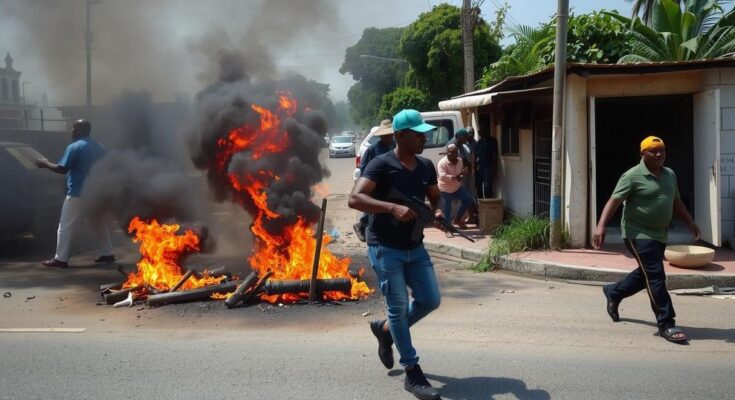Recent protests in Mozambique following presidential election results have resulted in approximately 125 deaths within three days of clashes. The announcement confirming the victory of Daniel Chapo of the Frelimo party ignited unrest, leading to allegations of electoral fraud by opposition leader Venancio Mondlane, alongside significant injuries and mass arrests amidst ongoing violence.
In Mozambique, violent confrontations following the recent presidential elections have resulted in approximately 125 fatalities within a mere three days, according to reports from a non-governmental organization. The violence erupted subsequent to the announcement by the country’s highest court confirming Daniel Chapo’s victory for the ruling Frelimo party, which has maintained power since 1975, with 65.17 percent support in the elections held on October 9. The decision triggered widespread protests led by the opposition, resulting in increased clashes with law enforcement agencies, looting incidents, and significant property damage.
The government initially reported 21 deaths within the first 24 hours of unrest in key urban centers. However, on Wednesday, the police chief indicated that a mass escape attempt from a prison near the capital, Maputo, resulted in the deaths of at least 33 inmates amidst ensuing confrontations with prison officers. The NGO Plataforma Decide later reported a cumulative death toll of 252 due to violence that has persisted since early October, illustrating the precarious security situation in the country. Areas severely impacted by the unrest include the vicinity of the capital, as well as northern provinces like Nampula and Beira, Mozambique’s second-largest city.
Continuing unrest has led to over 4,000 arrests connected to the demonstrations since October, with 137 being apprehended in the last three days alone. The primary opponent of Chapo, Venancio Mondlane, in exile, has alleged electoral fraud, claiming that the government and security forces are exacerbating the current turbulence to justify the enforcement of a state of emergency. While some barricades restricting movement around the capital have been removed, significant barriers remain, notably disrupting public transportation services.
The recent elections in Mozambique have been marred by allegations of irregularities and fraud, leading to significant unrest. Following the confirmation of the election results by the highest court, which granted Chapo of the Frelimo party a decisive victory, opposition forces began protesting, escalating tensions and resulting in violent clashes. The atmosphere has been increasingly unstable, with past instances of violence during political transitions raising concerns among international observers about the treatment of dissent in Mozambique. The ongoing violence reflects deeper systemic issues within the nation’s political landscape and public dissent against long-standing governance.
The post-election violence in Mozambique, marked by the deaths of approximately 125 individuals within three days, highlights the critical state of unrest following the presidential election results confirmed by the court. The situation remains tenuous, with allegations of electoral fraud and calls for a state of emergency, indicating a potential escalation in government crackdowns on dissent. As Mozambique confronts these challenges, the need for dialogue and resolution becomes paramount to restoring stability in the region.
Original Source: www.barrons.com




